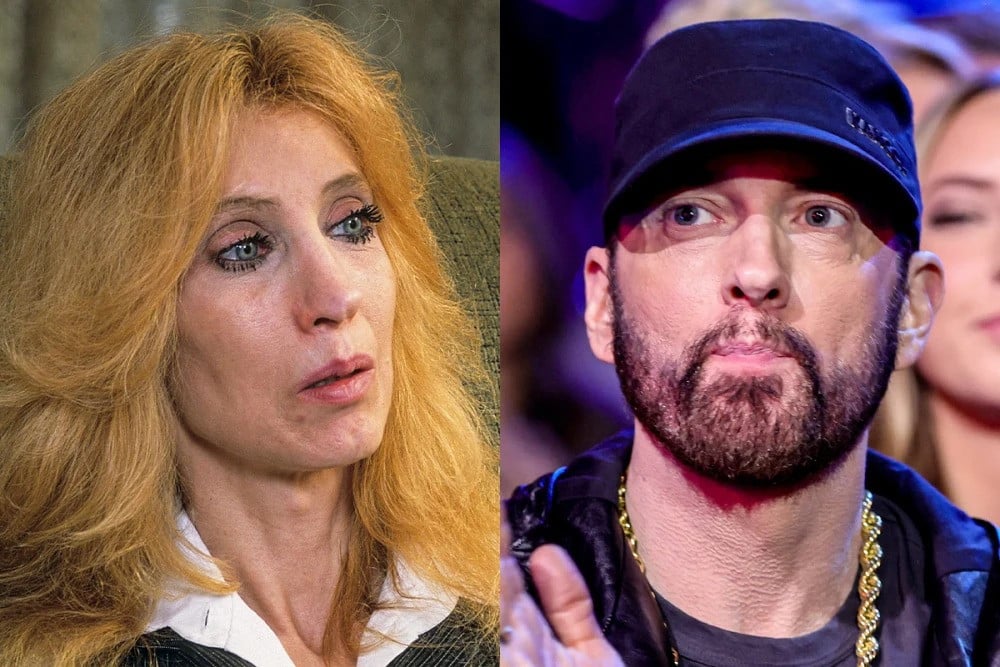Few relationships in the entertainment world have been as publicly dissected as the one between Marshall Mathers, better known as Eminem, and his late mother, Debbie Nelson. From contentious lawsuits to heart-wrenching lyrics, their dynamic has been anything but ordinary. Eminem’s rise to fame as one of the most iconic and controversial figures in rap history often intertwined with his personal struggles, many of which centered on his tumultuous relationship with Debbie.
Through the years, Eminem has been candid about his complicated feelings toward his mother, using his music to share raw and often painful accounts of their past. This article delves into the history of their relationship, the challenges they faced, and how Eminem ultimately sought closure.
A Troubled Beginning: Eminem’s Early Life
Eminem was born on October 17, 1972, in St. Joseph, Missouri, to Debbie Mathers and Marshall Bruce Mathers Jr. His father abandoned the family when Eminem was an infant, leaving Debbie to raise him on her own. They lived a life marked by instability, moving frequently between cities and struggling with poverty.
Debbie, who had her first child at 18, faced immense pressure as a young single mother. While her efforts to provide for her son were evident, Eminem’s accounts paint a stark picture of their home life. He has often described his childhood as chaotic and emotionally taxing, with a lack of consistent support and love. In songs like “Cleanin’ Out My Closet”, Eminem accused his mother of being emotionally abusive and neglectful.
While Debbie has denied many of Eminem’s claims, their fractured bond became one of the defining narratives in his music.
The Allegations: Abuse and Manipulation
Eminem’s allegations against Debbie Nelson began to surface publicly in the late 1990s and early 2000s. In his breakout album, The Slim Shady LP (1999), he introduced listeners to the strained relationship with songs like “My Name Is”, where he rapped about being mistreated as a child.
One of the most explicit tracks addressing their dynamic is “Cleanin’ Out My Closet” from The Eminem Show (2002). In the song, Eminem accuses Debbie of fabricating illnesses to gain sympathy and financial benefits through lawsuits and disability claims. He also alleged that she exposed him to unnecessary medication, creating long-term resentment.
Debbie, however, painted a different picture. In interviews and her memoir, My Son Marshall, My Son Eminem, she argued that Eminem exaggerated their issues for artistic and commercial purposes. She claimed to have been a caring mother who sacrificed for her son, expressing heartbreak over the portrayal of her as a villain.
Legal Battles and Public Feuds
The tension between Eminem and Debbie escalated into legal territory in 1999 when Debbie filed a $10 million defamation lawsuit against her son. She cited lyrics and interviews that, according to her, falsely depicted her as a drug addict and abusive parent. The lawsuit brought their private issues into the public spotlight, further straining their already fragile relationship.
The case was settled out of court in 2001 for $25,000, but the damage to their relationship was irreparable at the time. Debbie’s legal action only fueled Eminem’s anger, and their feud became a recurring theme in his music.
In the public eye, the lawsuit solidified the image of Debbie as a mother willing to exploit her son’s success for financial gain, though she consistently denied this characterization.
Finding Redemption: A Shift in Perspective
Despite years of public feuds, Eminem’s perspective on his relationship with Debbie began to shift in the late 2000s and early 2010s. The turning point came with the release of “Headlights” on The Marshall Mathers LP 2 (2013), a deeply personal track that showcased a newfound maturity in Eminem’s outlook.
In “Headlights”, Eminem apologized for the pain his earlier songs may have caused Debbie and expressed regret for airing their private struggles so publicly. He acknowledged that, despite their differences, Debbie did her best in difficult circumstances and deserved compassion. Lines like “I’m sorry, Mama, for ‘Cleanin’ Out My Closet’” marked a significant departure from the bitterness of his earlier work.
The song also revealed Eminem’s longing for reconciliation, highlighting the complexities of their bond. Fans and critics alike praised the track for its vulnerability, showcasing a more introspective side of the rapper.
Debbie’s Struggles and Later Years
Debbie Nelson faced her own challenges outside of her relationship with Eminem. Health issues, including a battle with breast cancer, added to her struggles. In interviews and her book, Debbie often spoke of the pain she felt from being estranged from her son and the misunderstandings that plagued their relationship.
Despite the animosity, there were reports in the years following “Headlights” that Eminem had reached out to Debbie and that the two were working on rebuilding their connection. While neither publicly confirmed the extent of their reconciliation, sources close to the family suggested that progress was made before Debbie’s death.
The Legacy of Their Relationship
Eminem’s relationship with Debbie Nelson serves as a powerful narrative of pain, forgiveness, and growth. For fans, it provided a window into the rapper’s psyche, making his music resonate on a deeply human level. The rawness with which Eminem addressed his feelings toward his mother highlighted the complexities of familial relationships, particularly those marked by trauma.
Debbie’s death in 2024 marked the end of a complicated chapter in Eminem’s life, but her influence on his artistry remains undeniable. Through their struggles, Eminem crafted some of the most compelling and vulnerable music of his career, connecting with listeners who saw their own struggles reflected in his lyrics.
Conclusion: A Story of Pain and Growth
The relationship between Eminem and Debbie Nelson was far from perfect, but it was profoundly human. Their story serves as a reminder that even in the most fractured relationships, there is room for reflection, understanding, and ultimately, forgiveness.
As Eminem continues his journey, the legacy of his relationship with his mother lives on in his music, shaping his identity as an artist and a person. It is a testament to the power of art as a means of processing pain and seeking closure—a story that resonates far beyond the confines of rap.



